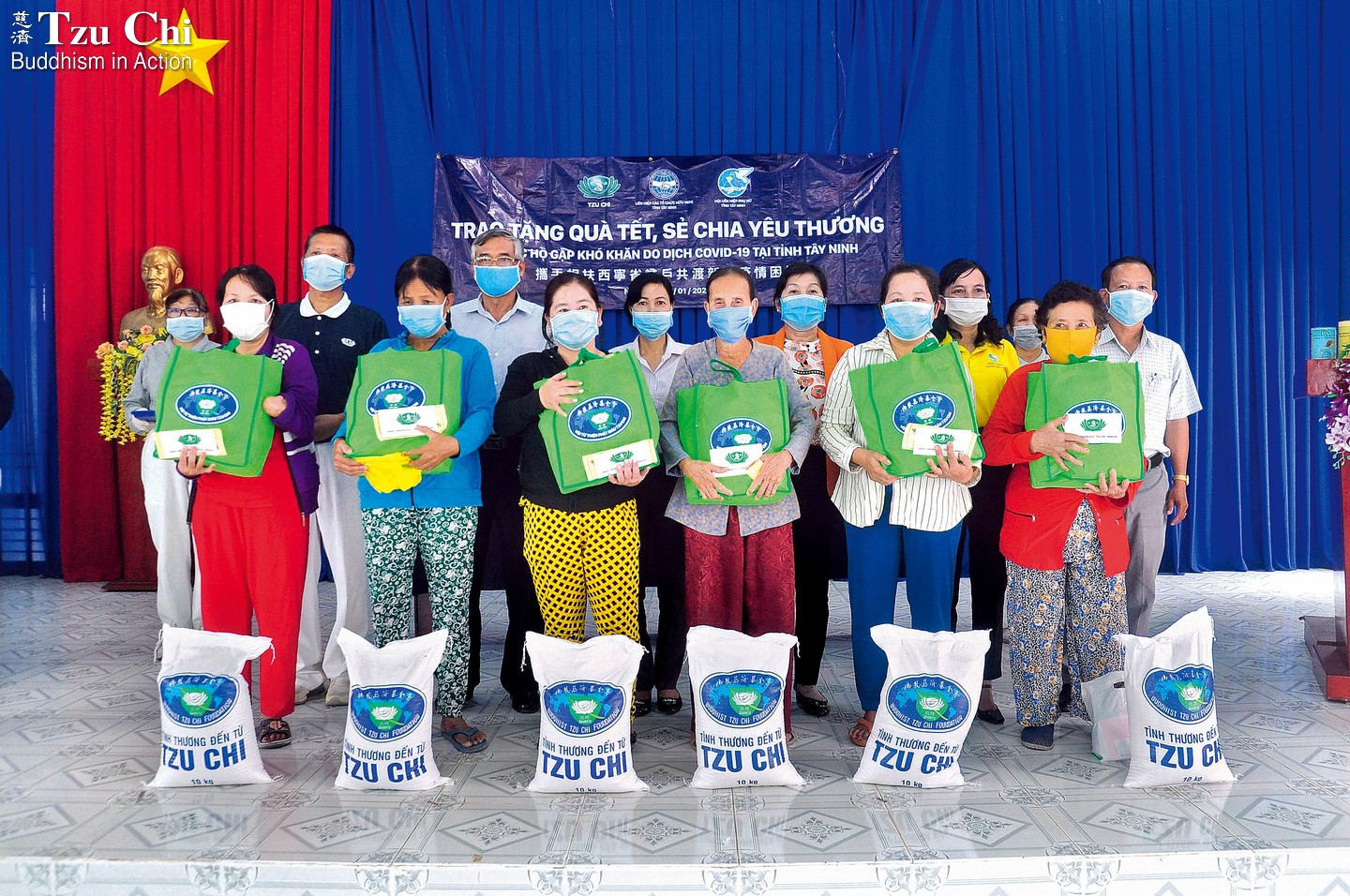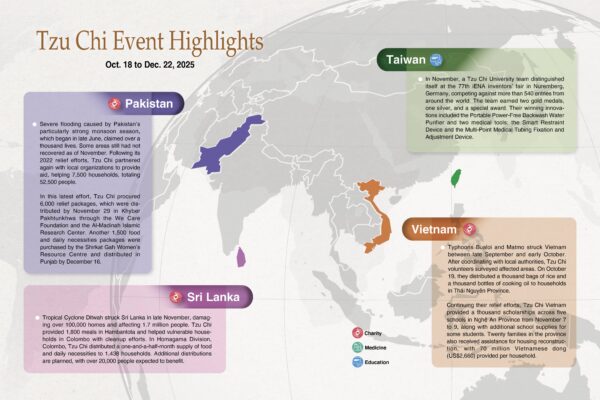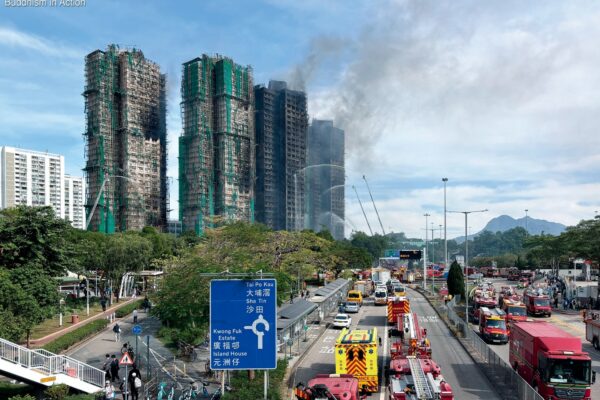By Yeh Tzu-hao
Translated by Wu Hsiao-ting
Photos courtesy of Tzu Chi Vietnam
Tzu Chi Vietnam distributed aid to more than 6,900 needy families in the first half of 2021 to help them overcome the financial challenges of COVID-19. A relief operation like this may not have been difficult to carry out in normal times, but these aren’t normal times. Nothing is easy or straightforward in a pandemic.

Working with local organizations, Tzu Chi Vietnam distributed aid to needy households in Tây Ninh Province in January 2021. Each family received a bag of rice weighing ten kilograms (22 pounds) and other necessities.
In April 2021, COVID-19 reared its head again in Asia. One of the countries adversely impacted was Vietnam, which had been noted for its exemplary management of the virus since the disease broke out over a year before. With a population of 98 million people, Vietnam had recorded just fewer than 3,000 confirmed cases by the end of April 2021, but that number spiked to more than 7,300 by the end of May. Despite the surge in infections, the country is still considered a model in the fight against COVID, especially when compared with other member states in the Association of Southeast Asian Nations.
A major contributing factor to Vietnam’s success in containing the spread of the virus was the stringent precautionary measures the government had enforced. For example, a community would be put on lockdown as soon as infections were detected in it. The same applied to factories. People diagnosed with the disease were rushed to the hospital for treatment, and fellow community residents were quarantined on-site, forbidden to leave the area until the lockdown was lifted. Daily essentials were provided by the government during such lockdown periods.
Such an aggressive strategy successfully reined in the virus, cutting it off before it could spread to more people, but it also resulted in a heavy economic toll. People who were financially better off managed to get by, but the underprivileged were not so lucky. Making ends meet became a struggle.
“Since 2020, everyone’s life, not just mine, has been turned upside down,” said Nguyen Thi Le Hoa, a Vietnamese Tzu Chi volunteer. “Many businesses have gone bankrupt, causing a lot of people to lose their jobs. The impact has spread beyond the economy. Everyone fears for their lives; wherever they go, they worry about being infected.”
Nguyen works in a foreign-owned company. When infections were diagnosed once again in Ho Chi Minh City during the latest wave of infections, her company forbid its employees living in the city to go to work in its factory in nearby Tây Ninh Province. The shuttle bus service provided by the company was suspended as well.
Nguyen is a finance executive at the company, so she began working from home. But not everyone in her company has fared as well as she. “Our company has had to lay off 50 percent of its employees since the outbreak of the virus last year to reduce our operational costs,” she explained. “Some of those who have lost their jobs have been able to regain employment, but others haven’t. The latter group had no choice but to live on unemployment relief.”
Spreading the distributions out
In addition to the underprivileged from before the pandemic, the number of people needing help continued to increase after COVID-19 erupted. Tzu Chi Vietnam responded to the need by working with the government to help families cope. From January to May 2021 alone, volunteers distributed food to more than 6,900 households in Ho Chi Minh City and the provinces of Hải Dương, Tây Ninh, and Trà Vinh.
The pandemic had made such events a challenge to carry out. In part, this was because citizens were urged to strictly follow the Vietnamese government’s “5K message” to protect them from the virus. The 5K message included “Khẩu trang” (face masks), “Khử khuẩn” (disinfection), “Khoảng cách” (distancing), “Không tụ tập” (no gatherings), and “Khai báo y tế” (health declarations). Among these precautionary protocols, “distancing” and “no gatherings” especially presented a challenge to volunteers.
“We arranged six distributions in January,” said Chen Da-yu (陳大瑜), head of Tzu Chi Vietnam. “But the pandemic situation escalated after we’d completed just two, disrupting our schedule for the others. As a result, we had to rearrange our distribution venues and times, redesign how to conduct the events, and notify households on our recipient rosters of the changes.” Volunteers scaled down the events to reduce the crowd at each distribution, but planned more distributions to make up for the downsizing. The original events would have been completed in two days, but the adjusted distributions were spread over a week.
Compiling recipient rosters was another challenge during the pandemic. Because the number of government staffers that could report to work had been reduced, there wasn’t enough manpower to help Tzu Chi prepare the rosters. As a result, volunteers were not able to obtain complete information about the recipient households. They couldn’t, for example, obtain data about the number of people in each family, or their gender and age. Tzu Chi sidestepped the problem by distributing enough food to each household to last three people for a month.
The items distributed included rice—a staple in Vietnam—along with noodles, cooking oil, seasoning, and masks. The food helped ease the burdens of the needy during a time when their livelihoods were impacted by the pandemic. The masks directly reduced the chance of disease transmission, and the food might have had the same effect, albeit indirectly. After all, if those who earn a living by doing odd jobs were able to cut down on the times they had to work, they would have had a lesser risk of contracting the disease.
Volunteers held tuition aid distributions for underprivileged students in Tây Ninh Province in April (top) and Hải Dương Province in May (bottom). Following the government’s COVID safety protocols, everyone kept a distance of at least one meter (3.3 feet). A student displays a coin bank she received from Tzu Chi to save money to help other needy people.
In addition to distributing the daily necessities during this difficult time, Tzu Chi Vietnam kept up its tradition of awarding tuition aid to disadvantaged students. In the past, volunteers would set up only one event venue in a city or district to award tuition aid. In response to the pandemic, however, they increased the number of venues to minimize the crowd at each event. For example, volunteers held award ceremonies at 11 locations in Hải Dương City, eight locations in Thanh Hà District, and six locations each in Tứ Kỳ and Thanh Miện Districts.
All the areas mentioned above were in the northern province of Hải Dương. Ta Thi Len, a resident of the province, has been a Tzu Chi volunteer for 20 years. She said the tuition aid distributed this May was a real blessing to her fellow residents. The province had experienced a particularly difficult time due to the pandemic. There had been a sudden surge in confirmed infections in Hải Dương this January. Strict preventive measures were put in place as a result, with neighboring provinces and cities limiting the interactive flow of people and goods with the province. The farm produce from Hải Dương had as a result sold very poorly.
The business sector suffered along with the agricultural sector. The government required the employees of local companies to be tested for COVID-19, and only those companies with a hundred percent negative tests were allowed to resume operation. Transportation regulations restricted the entry of raw materials into the province and the movement of products out of the area. All of this made it difficult for a company to operate.
Under these circumstances, the tuition aid provided by Tzu Chi was especially important for local needy families. Volunteer Chen Da-yu originally intended to travel north from Ho Chi Minh City to Hải Dương to assist in the distribution of the financial aid, but government officials in the province that were working with Tzu Chi to organize the distribution strongly urged him against doing so. They cited the danger of spreading or picking up the virus. Chen thus decided to leave the matter entirely in the care of local volunteers.
Volunteers conducted the events according to the government’s COVID-19 safety protocols. They overcame time and effort challenges presented by the increased number of events and successfully pulled off the mission despite the pandemic. All told, 215 elementary students each received one million dong (US$45); 364 junior high and 132 high school students each received 1.6 million dong (US$70) and two million dong (US$87), respectively. This regular aid from Tzu Chi was like timely rain for the students.
“The money will help the students pay off part of their school expenses and increase their chances of staying in school, thus lifting a load off their shoulders,” said volunteer Ta Thi Len.
Giving whenever possible
Volunteers also donated personal protective equipment (PPE) to help the country battle the virus, especially for the use of front-line workers on the border with Cambodia. They made the donation with the help of the Union of Friendship Organizations and the Red Cross. The items donated included medical masks, gloves, protective gowns, safety goggles, infrared thermometers, and other similar equipment. Aside from the PPE, volunteers also donated backpack disinfectant sprayers and solar power lights. The latter was provided “because some places on the border do not have electricity,” Chen Da-yu explained.
“The border personnel mainly deal with people trying to smuggle themselves into Vietnam,” Chen added. He said that the pandemic situation in Cambodia was even more severe than that in Vietnam, so reinforcements had been sent to that border to help out. With the added manpower there, the need for PPE also increased.
In a crisis like the pandemic, Tzu Chi volunteers in Vietnam would like to do more for the country, but they knew they had to be very circumspect about every step they took. This was due to the severity of the COVID-19 situation in Vietnam and the strict precautionary measures enforced by the government. After the latest wave of infections started in late April, they had no choice but to cancel some of their scheduled work. But they were happy that at least they accomplished as much as they did when COVID restrictions were less stringent.
“I was so moved when I saw aid recipients bursting into tears after receiving goods from us,” said volunteer Nguyen Thi Le Hoa. “I’m sincerely grateful to Master Cheng Yen for giving us the opportunity to form good affinities with our fellow country people.” With her heart full of joy from giving, Nguyen has continued cheering on her fellow volunteers in Ho Chi Minh City. “The government has urged against gatherings, so we suspended our recycling work,” she said. “But, working in small groups, we have continued to visit our long-term care recipients to check on their needs and help them through this challenging time. I’ve also called on everyone to attend our online study group sessions on Tuesday and Wednesday evenings [for spiritual nourishment].”
During this difficult time, volunteer Ta Thi Len, of the northern province of Hải Dương, thanked her counterparts in southern Vietnam for their support over the years. Their support has helped strengthened her determination to serve others. She said she had often reminded herself to study the Master’s teachings with diligence and seize every opportunity to give. She will always remember what a volunteer once said when Tzu Chi entered its 50th year: “The Master’s shoulders are small, but she is carrying the load of the world.” Ta knows that the best way to share the Master’s burden is to inspire more people to do good to help others, and to encourage more people to eat vegetarian. She’s been trying to do both things as much as possible.
Providing compassionate relief to hurting and suffering people around the world is the mission of Tzu Chi volunteers. Even though social distancing and travel restrictions have limited their movements, they will continue working for those in need and strive to provide help in a timely manner. Volunteers in Vietnam too will stay the course and help local underserved people ride out this crisis.
Looking Back on the Critical Year
By Nguyen Thi Le Hoa, Tzu Chi volunteer in Ho Chi Minh City
- Vietnam has experienced four waves of COVID-19 since the first case was diagnosed in the country. Each wave spread faster than the previous one. All schools in Ho Chi Minh City are now temporarily closed, so my son has moved home from school and is learning remotely. My parents are old, which makes them more vulnerable to the virus. So, our entire family stays home as much as possible to avoid infection. We keep our rooms clean, maintain a simple, healthy diet, and exercise to stay fit. I am grateful that all my relatives and friends have stayed safe and sound.
- Every evening, I watch Life Wisdom, a Da Ai TV program featuring Master Cheng Yen’s Dharma talks. Taking the Master’s words to heart, I have tried to transform my fear of the virus into concrete action to help others. Though everyone is having a hard time during this crisis, we should still do our best to give. I’ve also been encouraging others to eat vegetarian and pray sincerely for the pandemic to end as soon as possible. Our pious sincerity and kind thoughts will help see us through this crisis.



